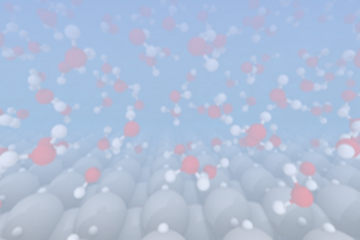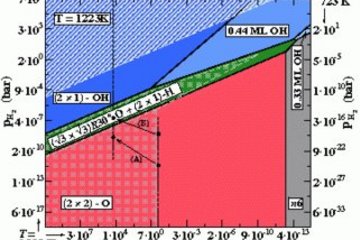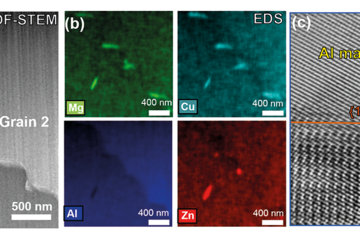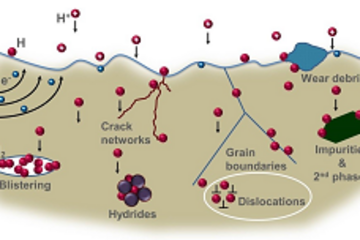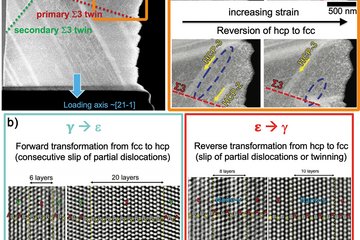All genres
281.
Poster
Atomistic modeling of the strain-induced interactions between C atoms in Fe–C solid solutions. International Workshop on Multiscale Materials Modelling (IWoM3), Berlin, Germany (2009)
282.
Poster
Hierarchical modeling of the mechanical properties of lobster cuticle from nano‐ up to macroscale: The influence of the mineral content and the microstructure. 4th International Conference on Multiscale Materials Modeling, Tallahassee, FL, USA (2008)
283.
Poster
First principles study of the alpha-iron stability limits. Ab initio Description of Iron and Steel: Magnetism and Phase diagrams (ADIS 2008), Ringberg Castle, Tegernsee, Germany (2008)
284.
Poster
First Principles Study of Fe–C interstitial solid solutions. International Workshop on Ab initio Description of Iron and Steel (ADIS2008), Ringberg Castle, Germany (2008)
285.
Poster
Error-propagation in multi-scale approaches to the elasticity of polycrystals. Spring meeting of the German Physical Society (DPG), Berlin, Germany (2008)
286.
Poster
Novel multi-descriptive approach to crystal plasticity of textured beta-Ti alloys. Deutschen Physikalischen Gesellschaft (DPG) Annual Meeting 2008, Berlin, Germany (2008)
287.
Poster
Bottom up design of novel titanium-based biomaterials through the combination of ab-initio simulations and experimental methods. Euromat 2007, Nürnberg, Germany (2007)
288.
Poster
First-Principles Study of the Carbon-Carbon Interaction in Iron. Euromat 2007, Nürnberg, Germany (2007)
289.
Poster
An ab-initio study of hardness anisotropy of crystalline alpha-chitin. Euromat 2007, Nürnberg,Germany (2007)
290.
Poster
Theory-guided design of Ti-binaries for human implants. "Theory Meets Industry" workshop, Vienna, Austria (2007)
291.
Poster
Hardness anisotropy of crystalline alpha-chitin: An ab-initio based conformational analysis. Spring meeting of the German Physical Society (DPG), Regensburg, Germany (2007)
292.
Poster
Ab-initio study of formation energies in steel and their relations to the solubility limits of carbon in austenite and ferrite. Multiscale Modeling of Condensed Matter, Sant Feliu de Guixols, Spain (2007)
293.
Poster
An ab-initio study of hardness anisotropy of crystalline alpha-chitin. International Max-Planck Workshop on Multiscale Modeling of Condensed Matter, Sant Feliu de Guixols, Spain (2007)
294.
Poster
Anomalous equilibrium volume change of magnetic Fe–Al crystals. 3rd Discussion Meeting on the Development of Innovative Iron Aluminium Alloys, Mettmann, Germany (2006)
295.
Poster
Ab initio study of chemical and structural trends of Ti-based binary alloys. Materials Research Society fall meeting, Boston, MA, USA (2006)
296.
Teaching
Combined theoretical and experimental study of ductile Mg alloys. Lecture: Mg Workshop, iMdea Materials Institute, Madrid, Spain, May 21, 2013 - May 24, 2013
297.
Teaching
Combined theoretical and experimental studies of ductile Mg alloys. Lecture: Advanced Materials 2013, Zhenjiang, Jiangsu province, China, May 16, 2013 - May 19, 2013
298.
Teaching
Ab-initio based multi-scale approaches to the elasticity of metallic polycrystals and hierarchical biocomposites. Lecture: XI National Congress on Theoretical and Applied Mechanics, Borovets, Bulgaria, September 02, 2009 - September 05, 2009
299.
Teaching
Ab initio and density functional calculations. Lecture: CCMX Summer School Course "Modelling in Materials Science: Theory and Applications" at EPFL (Ecole Polytechnique Federale de Lausanne), Lausanne, Switzerland, August 26, 2009 - August 28, 2009
300.
Teaching
Ab initio based approaches to the theory-guided materials design. Lecture: EU Regional School – Materials Science, Aachen Institute for Advanced study in Computational Engineering Science (AICES), RWTH Aachen, Germnay, September 22, 2008




